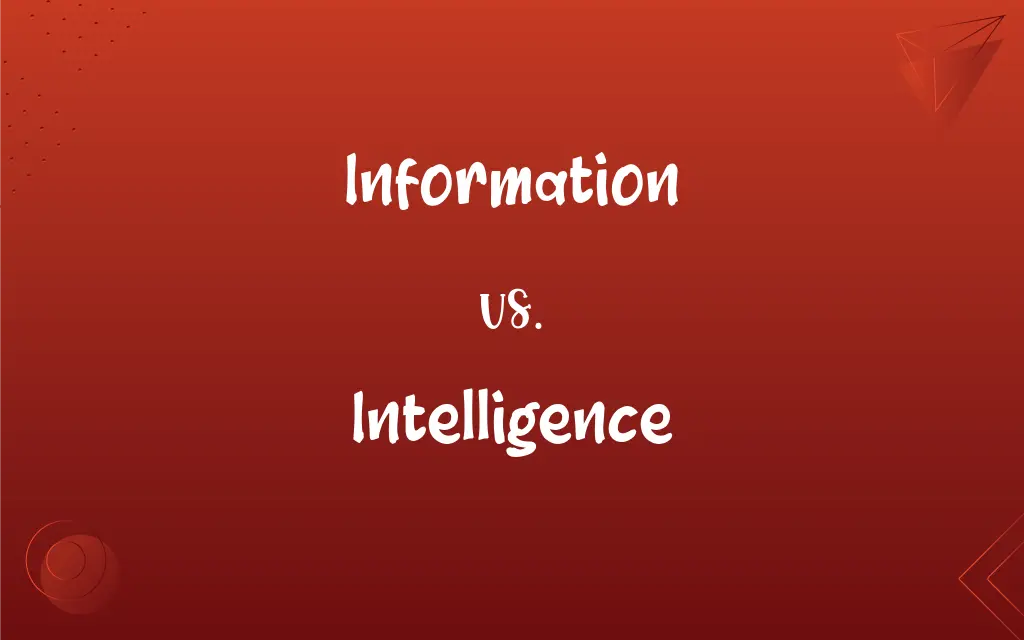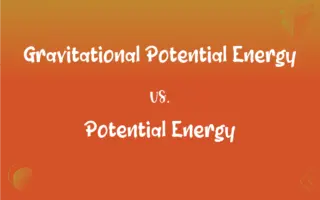Information vs. Intelligence: What's the Difference?
Edited by Aimie Carlson || By Janet White || Published on January 2, 2024
Information refers to data or facts, while intelligence is the analysis and interpretation of information, often to inform decisions.

Key Differences
Information comprises data, facts, or details that can be used or analyzed. Intelligence is the outcome of processing and interpreting information to form insights or informed opinions.
Information is raw and unprocessed, like statistics or news reports. Intelligence involves context, analysis, and the application of judgment, like a strategic report.
Information can come from various sources and remains factual. Intelligence is derived from information but includes analysis, synthesis, and context.
The purpose of information is to inform and provide data. Intelligence is used for decision-making, strategies, and understanding complex situations.
Information can be simple or complex but is typically straightforward. Intelligence involves layers of complexity and interpretation.
ADVERTISEMENT
Comparison Chart
Definition
Data, facts, or details.
Analysis and interpretation of information.
Context of Use
Raw and unprocessed.
Involves context, analysis, and judgment.
Source and Processing
Comes from various sources, factual.
Derived from information, includes synthesis.
Purpose and Application
To inform and provide data.
Used for decision-making and understanding complexities.
Representation and Complexity
Can be simple or complex, typically straightforward.
Involves layers of complexity and interpretation.
ADVERTISEMENT
Information and Intelligence Definitions
Information
Facts or data provided or learned about something.
The brochure provides information about the hotel's amenities.
Intelligence
The outcome of analyzing information to form insights.
The report provided valuable intelligence on market trends.
Information
Knowledge acquired through study, experience, or instruction.
She gathered information on gardening techniques from various books.
Intelligence
The ability to acquire and apply knowledge and skills.
Her intelligence was evident in her quick learning of new languages.
Information
The communication or reception of knowledge or intelligence.
The news channel delivered information on current events.
Intelligence
The processing and interpretation of data to inform decisions.
Business intelligence helps companies make strategic decisions.
Information
Data available for analysis or processing.
The researcher collected information from the survey for analysis.
Intelligence
A measure of one's cognitive abilities.
His high intelligence allowed him to solve complex problems easily.
Information
Details or news provided or learned about an event.
The police requested information from witnesses about the accident.
Intelligence
The collection of information of military or political value.
The agency gathered intelligence on enemy troop movements.
Information
Knowledge or facts learned, especially about a certain subject or event.
Intelligence
The ability to acquire, understand, and use knowledge
A person of extraordinary intelligence.
Information
The act of informing or the condition of being informed; communication of knowledge
Safety instructions are provided for the information of our passengers.
FAQs
Can the same information lead to different intelligence?
Yes, different analyses or perspectives can lead to varying intelligence outcomes.
Is information always factual?
Information is intended to be factual, but it can be subject to inaccuracies.
Can intelligence exist without information?
No, intelligence requires information as its base for analysis.
Is information always objective?
Information is intended to be objective, but it can be presented subjectively.
Does intelligence always involve analysis?
Yes, intelligence involves the analysis and synthesis of information.
Is all information considered intelligence?
No, intelligence is derived from the analysis and interpretation of information.
Can technology process information into intelligence?
Yes, technologies like AI can process information to generate intelligence.
How does artificial intelligence relate to human intelligence?
Artificial intelligence simulates human intelligence in processing and decision-making.
Can misinformation be considered information?
Misinformation is false information, but it can be considered information in a broader sense.
How is intelligence used in business?
Business intelligence is used for strategic planning and decision-making.
Do all businesses use intelligence?
Most businesses use some form of intelligence for decision-making and strategy.
Is information limited to data and statistics?
No, information can include a broad range of data, facts, and details.
Can intelligence be inaccurate?
Yes, intelligence can be inaccurate if based on flawed analysis or information.
Can information change over time?
Yes, as new data becomes available, information can be updated or revised.
Does intelligence only refer to human cognitive abilities?
No, it also refers to the collection and analysis of information in various contexts.
Is intelligence gathering ethical?
It depends on the method and purpose; ethical considerations vary widely.
Can personal experiences be classified as information?
Yes, personal experiences can provide valuable information.
Is intelligence gathering always intentional?
Generally, yes, especially in contexts like military or business intelligence.
Is all collected information useful?
Not all information is useful; relevance depends on the context and need.
Does intelligence always lead to correct decisions?
Not always; decisions are as good as the intelligence and judgment applied.
About Author
Written by
Janet WhiteJanet White has been an esteemed writer and blogger for Difference Wiki. Holding a Master's degree in Science and Medical Journalism from the prestigious Boston University, she has consistently demonstrated her expertise and passion for her field. When she's not immersed in her work, Janet relishes her time exercising, delving into a good book, and cherishing moments with friends and family.
Edited by
Aimie CarlsonAimie Carlson, holding a master's degree in English literature, is a fervent English language enthusiast. She lends her writing talents to Difference Wiki, a prominent website that specializes in comparisons, offering readers insightful analyses that both captivate and inform.






































































